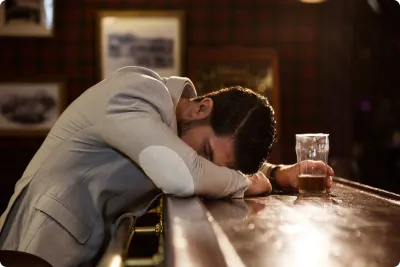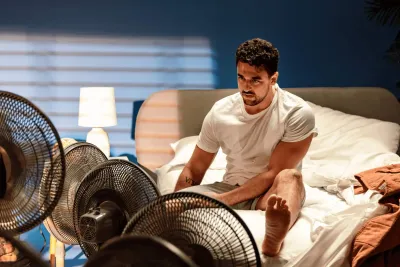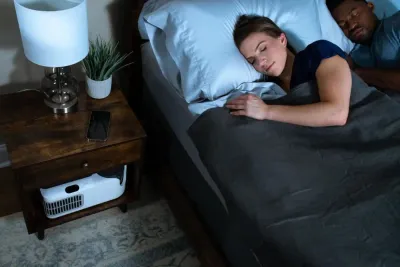How Alcohol Affect Your Sleep?
Ana Marie Schick: Resident Sleep Expert and Certified Health Coach • Jun 04, 2024

Key Takeaways
Alcohol may feel like a sleep aid at first, but it often disrupts sleep quality and recovery as the night goes on.
- Alcohol’s sedative effect can help you fall asleep faster, but that drowsy feeling fades quickly.
- As alcohol is metabolized, sleep often becomes lighter and more fragmented, with more frequent awakenings later in the night.
- Drinking before bed reduces REM sleep, which plays a key role in memory, mood regulation, and overall sleep quality.
- Alcohol can lower heart rate variability (HRV), signaling increased stress on the body and reduced overnight recovery.
- Regular evening drinking can interfere with your circadian rhythm, making it harder to maintain consistent sleep and wake times.
Everyone enjoys a good drink every once in a while, whether it’s a craft beer, an elaborate cocktail, or a glass of fine wine. But, the popular question usually is - does alcohol help you fall asleep and improve your sleep quality?
Alcohol is a depressant, and one of the biggest myths about it is that consuming a few drinks before bedtime can help you sleep better. Alcohol interacts with the brain's chemical messengers to impact sleep and wake cycles, affecting sleep quality and daytime alertness. But while drinking alcohol might help you fall asleep faster, that’s the extent of its sleep-related benefits.
Right away, we can answer the question this post poses:
Yes, the amount of alcohol can hurt your sleep quality.
We’ll discuss how alcohol affects sleep. Plus, you can use simple yet effective approaches instead of drinking before bedtime.
Why Does it Make You Sleepy?
Anyone who’s ever had a drink or more understands that alcohol consumption can make you sleepy at night.
Alcohol has sedative effects that impact sleep and daytime alertness. It slows down brain activity, makes you feel tired, and helps you relax, which can result in falling asleep faster.
Researchers have found that alcohol's sedative effects last only for the first part of the night. [1] Somebody who consumes alcohol before bed doesn’t wake up as often during the first few hours of sleep. If they happen to wake up, it’s for a shorter period.
Get Deeper & Restorative Sleep
Water has higher thermal conductivity than air, allowing for more efficient cooling and heating. Our cooling mattress pads give you the ability to find the right temperature, ranging from 55-115º to improve your deep sleep, sleep better, and wake up rested.
How Alcohol Consumption Affects Sleep
People often think, “I wonder if alcohol makes you sleepy or helps you sleep?” A recent study found that 20% of Americans use drinking alcohol to fall asleep at night. [2]
The problem with this method is that even though it might help you fall asleep, what happens afterward would not be considered a good night’s sleep.
Note: Alcohol’s impact on sleep largely depends on the individual. However, it's important to understand that alcohol consumption does not guarantee a good night's sleep due to its disruptive effects on the sleep cycle, leading to sleep disruption, decreased sleep quality, and increased awakenings throughout the night.
Less Restorative Sleep
Restorative sleep enables the body to repair and replenish the cellular components required for essential biological functions that are depleted throughout an awake day.
Drinking alcohol before bed can generate the delta wave activity associated with deep sleep. However, it can also trigger alpha wave activity, typically occurring while you’re resting quietly, not full-bore sleeping.
These competing sleep patterns mean your body and mind will not obtain the restorative night’s sleep they need to be at the peak of their powers.
Did You Know: Individuals who drink alcohol before bed can experience insomnia symptoms and potentially feel excessively sleepy the following day. Additionally, more alcohol consumption can exacerbate sleep disorders, including sleep apneas, further disrupting normal sleep physiology and significantly impacting daytime alertness.
Physiological Changes
Drinking unreasonable amounts of alcohol may provoke acute physiological changes, including:
- Increasing your body temperature
- Skin flushing may occur
- Dehydrating the body
Neither of the above items contributes to getting a restorative night's sleep!
Note: Dehydrating the body can lead to night sweats, make you feel hot, and wake you up because you are thirsty.

Less REM Sleep Due to Alcohol
Alcohol can cause sleep disruptions and reduce REM sleep, the deepest stage of sleep during which dreams occur. This means that even if you get enough hours of sleep, you may still wake up feeling tired and groggy. More than usual wake-up events can further disrupt REM sleep. All sleep stages pull their weight, but deep sleep and REM are the MVPs when it comes to rebooting your body and mind.
Related Blog: Understanding Sleep Stages: What Happens During Each
They're the heavy lifters behind physical recovery and mental clarity. Since alcohol inhibits REM sleep (Rapid Eye Movement), it adversely affects your motor functions, memory, and more.
Study: Alcohol research shows that chronic alcohol users often face a scrambled sleep cycle—less deep, slow wave sleep and an uptick in REM. Translation: more dreams, less restoration, and a serious downgrade to your body’s nightly repair system.
Weakened Heart Rate Variability (HRV)
Consuming alcohol can impact your heart rate variability (HRV), which measures the time between your heartbeats. HRV is important because it reflects how adaptable your body can be.
Determining HRV and body temperature variations is critical to understanding normal sleep. Alcohol consumption complicates this because it weakens heart rate variability and increases it.
According to research by the Cleveland Clinic, alcohol intake can accelerate the heart rate and contribute to panic attacks in some individuals. [3]
HRV can decrease by consuming alcohol, so your heartbeats become more regular and less variable. This is because alcohol can disrupt the balance of your nervous system, causing your heart rate to slow down and become less responsive to changes in your environment.
Circadian Rhythm Disruption
Falling asleep fast after drinking comes with a price: there’s a strong chance you’ll wake up in the middle of the night. It produces adenosine, a chemical that signals it is time to go to sleep.
However, that quick (and unnatural) fix of adenosine disappears soon after it arrives, increasing the likelihood that you’ll wake up sooner than you should.
Read More: Understanding Circadian Rhythm and Sleep
Bathroom Breaks Frequently
Drinking before bed usually leads to one or more bathroom trips at night. Generally, your body prevents the urge to go to the bathroom while you sleep.
But between the potential to disrupt sleep we’ve already discussed and the fact that what goes in must come out, consuming alcohol in the evenings means you’re going to struggle to stay asleep.
Drinking alcohol can act as a diuretic, which increases the amount of urine your body produces and releases. Alcohol affects sleep and makes you have more trips to the bathroom which means less sleep.

Restricted Airflow and Snoring
While alcohol relaxes your mind, it has the same impact on your body. This includes your throat and jaw muscles, which, at best, can restrict airflow, leading to snoring, and, at worst, induce mild sleep apnea.
In addition, alcohol can also cause inflammation in the airways, making it harder for air to pass through and leading to further snoring.
As you can see, there are significant disadvantages to drinking before bed. Studies show that heavy drinking or moderate consumption can cause sleep apnea in people who don't have a sleep disorder. [4]
Did You Know: Studies suggest drinking alcohol increases the risk of sleep apnea by 25%. [5]
Sleep Apnea Symptoms
Sleep apnea can be a potentially serious disorder in which breathing frequently stops and starts. Sleep apnea symptoms can include the following:
- Snoring
- Morning headaches
- Irritability
- Difficulty staying asleep throughout the night
- Gasping for air while sleeping
Talk to your doctor if you have symptoms or signs of sleep apnea.
Potentially Cause Insomnia
The biggest issue about consuming alcohol, it can cause insomnia. Drinking alcohol can potentially cause insomnia symptoms and feeling groggy the following day and has been proven to reduce REM sleep.
This can interrupt your sleep cycle. People who have been diagnosed with alcohol disorders report signs of insomnia.
Did You Know: 35-70% of alcohol users report sleep problems consistent with clinical insomnia. [6]
Realistic Dreams
Having alcohol in your system when going to bed can increase the person's chances of having vivid dreams, sleepwalking, or nightmares. This can diminish the quality of sleep. Additionally, alcohol can cause dehydration, which can lead to more vivid and intense dreams as your brain works to compensate for the lack of fluids.
Final Thought
On a typical night, your brain runs a full sleep program—cycling through light sleep, deep sleep, and REM like clockwork. Each stage plays a vital role in keeping your system optimized and fully recharged.
But throw alcohol into the mix, and things start to glitch. Studies show that chronic alcohol users often experience disrupted sleep cycles—less restorative slow-wave sleep and more REM, which can leave you feeling foggy instead of refreshed.
Now, this doesn’t mean you have to quit your evening glass of wine cold turkey. While alcohol and sleep don’t always play nicely together, understanding how it impacts your sleep can help you make smarter choices. Take it as far as you want—maybe just enough to level up your nightly recharge.
Did You Know: Research has also associated binge drinking with disrupted sleep. [7]
You may reduce or stop drinking before bedtime on weekdays, or if you’re going to track the effects of alcohol more intensely, some products track HRV, including our non-wearable sleep tracker and body temperature trends—then see how those measurements and others change on the nights you consume alcohol.
It's crucial to be aware of the adverse effects of alcohol, which can significantly impair sleep and overall health by causing rapid fluctuations in blood sugar levels, and sleep apnea, leading to symptoms that can exacerbate sleep disturbances.
Did You Know: People should stop drinking alcohol at least four hours [8] before bedtime; this can help reduce the likelihood of someone’s chance of sleep disruptions.
The most important takeaway is a common refrain for those struggling to sleep: reflecting on your habits and potentially changing some of them might positively impact your overall quality of sleepy too. Alcohol is simply one habit that might hurt more than help.
Frequently Asked Questions About Alcohol and Sleep
Does Alcohol Actually Help You Fall Asleep Faster?
Yes—but only at first. Alcohol has sedative effects that can make you feel relaxed and sleepy, helping you fall asleep faster. However, as the night goes on, it disrupts your sleep cycle and prevents you from reaching restorative deep and REM sleep.
How Does Alcohol Affect My Sleep Quality?
Alcohol can lead to:
- Shorter deep and REM sleep cycles
- More awakenings during the night
- Increased snoring or mild sleep apnea
- Dehydration and frequent bathroom trips
- Lower heart rate variability (HRV)
These effects often leave you groggy and unrested, even if you’ve “slept” for eight hours.
What’s the Best Way to Improve Sleep Without Alcohol?
Skip the nightcap and try:
- Cooling your sleep environment with a bed cooling system
- Sticking to a consistent bedtime
- Avoiding alcohol at least four hours before sleep
- Staying hydrated throughout the day
- Tracking your sleep data with a non-wearable sleep tracker
A few small changes can help you wake up clear-headed and ready to go—no hangover required.
Peer-Reviewed Research References
-
Ebrahim, I. O., et al.
Alcohol and Sleep I: Effects on Normal Sleep.
Alcoholism: Clinical and Experimental Research, 2013.
Study Type: Controlled Sleep Physiology Review
Key Finding: Alcohol may shorten sleep onset initially, but it significantly disrupts sleep architecture later in the night by suppressing REM sleep, increasing awakenings, and fragmenting overall sleep quality.
View Study
Source URL: https://onlinelibrary.wiley.com/doi/10.1111/acer.12006
-
National Institute on Alcohol Abuse and Alcoholism (NIAAA).
Sleep, Sleepiness, and Alcohol Use.
NIAAA, n.d.
Study Type: Government Health Education Resource
Key Finding: Alcohol interferes with circadian rhythm regulation, suppresses REM sleep, and contributes to insomnia, nighttime awakenings, and daytime sleepiness with repeated use.
View Resource
Source URL: https://www.niaaa.nih.gov/alcohols-effects-health
-
Cleveland Clinic.
Why Am I Panicking in My Sleep?
Cleveland Clinic Health Essentials, 2021.
Study Type: Clinical Health Education Resource
Key Finding: Alcohol can increase nighttime anxiety and panic symptoms as blood alcohol levels decline during sleep, activating the sympathetic nervous system.
View Resource
Source URL: https://health.clevelandclinic.org/why-am-i-panicking-in-my-sleep
-
Simou, E., Britton, J., & Leonardi-Bee, J.
Alcohol and the Risk of Sleep Apnoea: A Systematic Review and Meta-Analysis.
Sleep Medicine, 2018.
Study Type: Systematic Review & Meta-Analysis
Key Finding: Alcohol significantly increases the risk and severity of obstructive sleep apnea by relaxing upper airway muscles and worsening breathing instability during sleep.
View Study
Source URL: https://www.ncbi.nlm.nih.gov/pmc/articles/PMC5840512/
-
Simou, E., Britton, J., & Leonardi-Bee, J.
Ibid.
Study Type: Systematic Review & Meta-Analysis
Key Finding: Alcohol-related airway relaxation contributes to increased apnea events and oxygen desaturation during sleep, particularly in individuals with existing sleep-disordered breathing.
-
Angarita, G. A., Emadi, N., Hodges, S., & Morgan, P. T.
Sleep Abnormalities Associated with Alcohol, Cannabis, Cocaine, and Opiate Use.
Addiction Science & Clinical Practice, 2016.
Study Type: Comprehensive Substance Use Review
Key Finding: Alcohol use is associated with insomnia, reduced sleep efficiency, REM suppression, and rebound sleep disruption during withdrawal or reduced intake.
View Study
Source URL: https://www.ncbi.nlm.nih.gov/pmc/articles/PMC4872305/
-
Stein, M. D., & Friedmann, P. D.
Disturbed Sleep and Its Relationship to Alcohol Use.
Substance Abuse, 2005.
Study Type: Clinical Review & Observational Analysis
Key Finding: Sleep disturbance both contributes to and results from alcohol use, creating a reinforcing cycle where poor sleep increases alcohol reliance and alcohol further degrades sleep quality.
View Study
Source URL: https://www.ncbi.nlm.nih.gov/pmc/articles/PMC2775419/
-
Stein, M. D., & Friedmann, P. D.
Ibid.
Study Type: Clinical Review & Observational Analysis
Key Finding: Persistent sleep disruption is a risk factor for relapse in individuals recovering from alcohol use disorder, emphasizing the importance of sleep-focused interventions.









